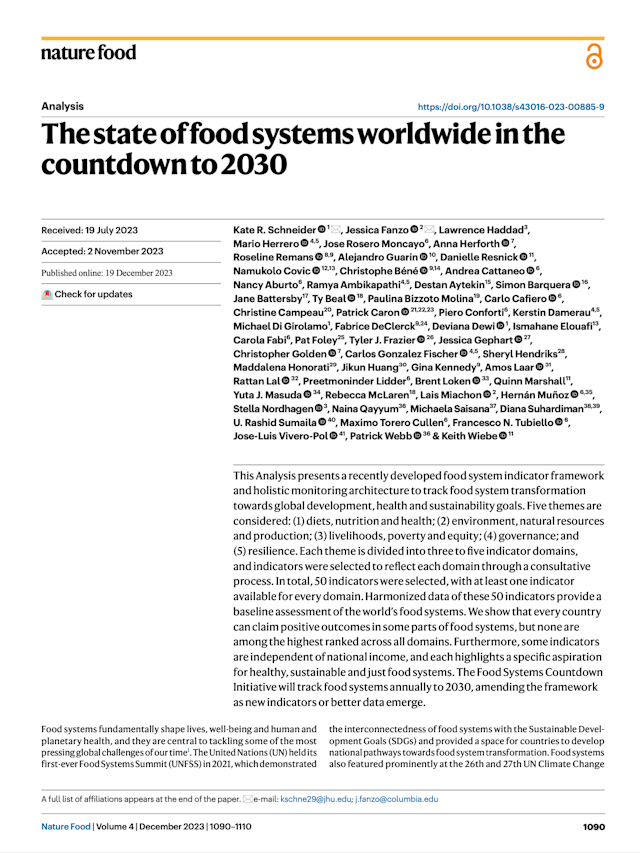GAIN, FAO (2023) The food systems countdown report 2023
This policy brief – the first in a planned annual series – presents the Countdown indicators depicting the current state of national food systems. In doing so, it provides a starting point for future work to identify where things can be done better, provide ideas for how to get there, and inspire stakeholders (in particular, policymakers) that progress can and must be made.
19 December 2023. Rome/London - "The state of food systems worldwide in the countdown to 2030", published today by The Food Systems Countdown to 2030 Initiative (FSCI), provides the first science-based monitoring to guide decision-makers as they seek wholesale transformation of the global agriculture and food systems. This transformation is needed urgently both to reduce the environmental impact of these systems and to mitigate the impact of climate change on them. The overarching objective is that all people – especially the most vulnerable – have equitable access to healthy diets through sustainable and resilient agriculture and food systems.
This Analysis presents a recently developed food system indicator framework and holistic monitoring architecture to track food system transformation towards global development, health and sustainability goals. Five themes are considered: (1) diets, nutrition and health; (2) environment, natural resources and production; (3) livelihoods, poverty and equity; (4) governance; and (5) resilience. Each theme is divided into three to five indicator domains, and indicators were selected to reflect each domain through a consultative process. In total, 50 indicators were selected, with at least one indicator available for every domain. Harmonized data of these 50 indicators provide a baseline assessment of the world’s food systems. We show that every country can claim positive outcomes in some parts of food systems, but none are among the highest ranked across all domains. Furthermore, some indicators are independent of national income, and each highlights a specific aspiration for healthy, sustainable and just food systems. The Food Systems Countdown Initiative will track food systems annually to 2030, amending the framework as new indicators or better data emerge.
The UN Food Systems Summit catalysed agriculture and food system action, though policymakers often lack the data required to drive critical decisions. The FSCI is filling that gap, having identified an indicator framework composed of 50 indicators that monitor agriculture and food systems at a global level, using existing data to enable immediate action. Repurposing existing data, rather than carrying out time-consuming new research, means policymakers have quick access to relevant information.
Following this first global baseline, the FSCI will track agriculture and food systems annually until 2030, updating the framework as needed where new indicators or better data emerge.
The UN Food Systems Summit catalysed agriculture and food system action, though policymakers often lack the data required to drive critical decisions. The FSCI is filling that gap, having identified an indicator framework composed of 50 indicators that monitor agriculture and food systems at a global level, using existing data to enable immediate action. Repurposing existing data, rather than carrying out time-consuming new research, means policymakers have quick access to relevant information.
Following this first global baseline, the FSCI will track agriculture and food systems annually until 2030, updating the framework as needed where new indicators or better data emerge.
“The first annual Countdown report shows that no single region has all the answers. Europe and North America do well on undernutrition but poorly on indicators of unhealthy diets. In contrast, Africa and South Asia do relatively well on some environmental indicators but poorly on indicators of livelihoods. The data show very clearly that every region has significant room for improvement.” Lawrence Haddad, Executive Director, Global Alliance for Improved Nutrition


No comments:
Post a Comment